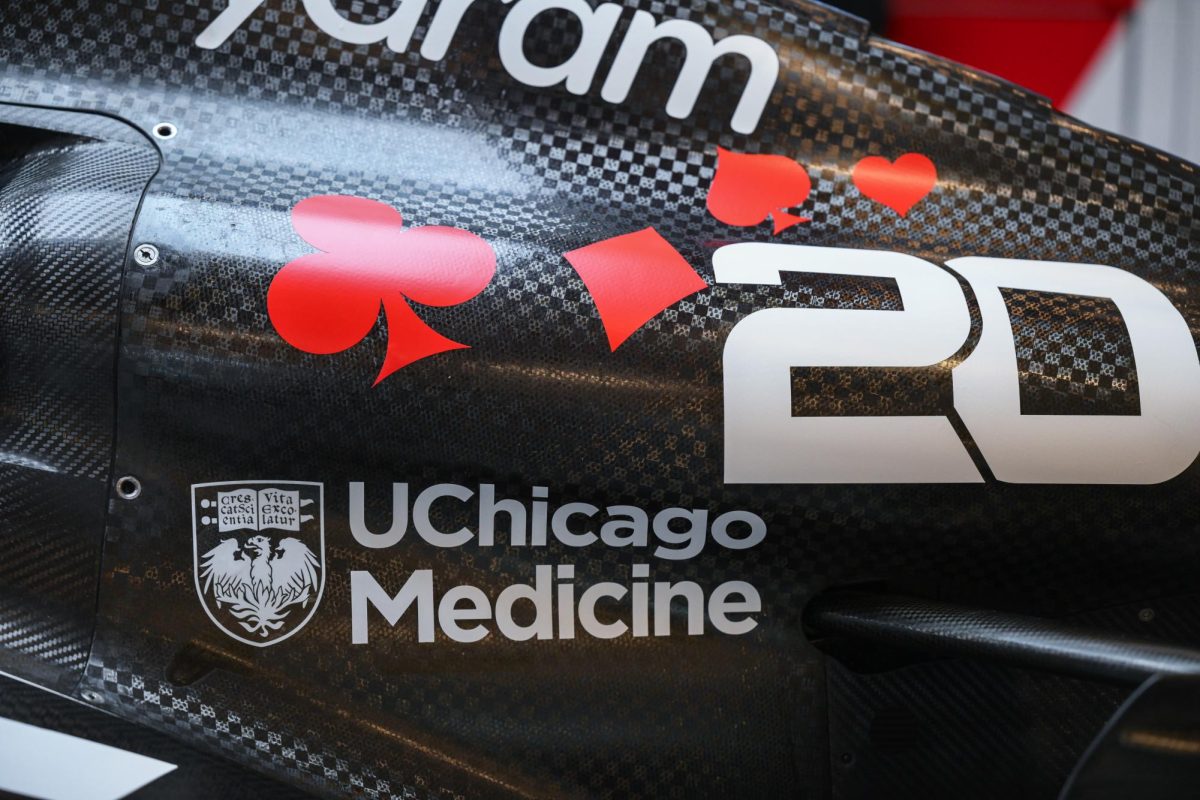At the Formula 1 Las Vegas Grand Prix in November, an unexpected sight zipped across the racetrack: the UChicago Medicine (UCM) logo, prominently displayed on the Haas Formula 1 (F1) car. This marked the beginning of UCM’s groundbreaking partnership with the MoneyGram Haas F1 Team, making it the first known sponsorship by a healthcare provider in Formula 1. The partnership, announced on November 21, seeks to expand UCM’s global reach and strengthen ties with international patients.
According to UCM’s press release, they will serve as an “Official Supporter of the MoneyGram Haas F1 Team” through the 2025 season before becoming an “Official Healthcare Partner” through 2027.
The partnership with Haas debuted at the Las Vegas Grand Prix, which took place from November 21 to November 23, in the 22nd round of the 2024 FIA Formula One World Championship. UCM’s branding appeared on the car’s livery and will be featured on the team’s gear starting in the 2025 season.
In an interview with the Maroon, UCM’s Vice President and Chief Marketing Officer Andrew Chang expressed a desire to capitalize on UChicago’s prominent brand. “A lot of our patients actually do come from all over the world, and so by helping our brand get out there in a more national and international presence, it really will help us get more patients and get more doctors around the world to get to know who we are and be able to collaborate with us more, whether it’s research or patient care,” he said. “We’re also trying to tap a more diverse, younger audience in the U.S.”
This marks UCM’s second sponsorship of a major sports team, building on their partnership with the WNBA’s Chicago Sky basketball team. While the collaboration with the Chicago Sky reaffirms UCM’s commitment to the Chicago area, Chang says that the Formula 1 partnership aligns with their broader international strategy.
“There aren’t too many sports properties or sponsorship opportunities that are actually just global and not necessarily centered around a physical location all the time. Formula 1 has that global presence with over a billion and a half fans and regular viewers,” Chang said.
Formula 1’s 2024 and 2025 calendars feature 24 races each across five continents, including three races in the U.S. and four in the Middle East, which, according to Chang, is UCM’s largest market for international patients.
UCM’s entrance into a Formula 1 sponsorship also aligns with their emphasis on cutting-edge technology and innovation. “The University of Chicago itself has been known for innovation through its research and breakthroughs. There aren’t too many sports that are also known for that,” Chang said. “Every sport, of course, is innovative in its own way, but from a truly science [and] data analytics sort of way, it’s motorsport.”
The Haas F1 Team is currently the only U.S.-based team, although that will change in 2026 with General Motors set to compete under the Cadillac brand. “[Haas] is not top three—they’re not necessarily a Mercedes or a Ferrari or a Red Bull, but they are the only team based in the U.S… and they also outpunch their media exposure,” he said. “So through a partner that’s truly global, we really found the perfect fit… to take our brand to the next level.”
The Haas F1 Team made its Formula 1 debut in 2016, becoming the first all-American-led team in the sport in three decades. Haas placed seventh out of 10 teams in the 2024 constructor standings, improving from its last-place finish in 2023. Next season, they are welcoming a new driver lineup featuring seven-season veteran Esteban Ocon and rookie Oliver Bearman, the latter having gained recognition within the F1 community after stepping in as a reserve driver for two races in 2024. “We’re catching them on the up-and-up,” Chang said.
UCM is already working on plans for live activations at the Grand Prix races in Miami, Austin, and Las Vegas next season. They also aim to connect their faculty and researchers with Haas to explore further opportunities for collaboration and innovation.
“[Haas] has their own trainers and medical staff, of course, but we have literally the most innovative research and science that’s all behind it,” Chang said. “And so how do we give them that slight edge that makes the driver or the crew just that much better, and shave that 0.1 seconds off their time.… There’s so many possibilities of how we can collaborate.”
Chang also hopes to bring more attention to the partnership within the community around UChicago, potentially through events on campus featuring Haas team members or a car display, or by organizing an activation in the larger Chicago area.
For Chang, the ultimate success of the partnership will be measured by its influence on national and international patient volumes and global awareness of UCM.
“We’re trying to do things outside the box in a way that still makes sense from a business and community standpoint and that really catches the attention of our intended audiences,” Chang said. “Our country really needs change in healthcare, and [UCM] is trying to accomplish that, from the South Side to the country to the world.”










Puzzled alum / Jan 11, 2025 at 12:07 am
Is this satire?
Bob Michaelson / Jan 10, 2025 at 8:16 pm
UofC Medicine “sponsoring” racing car teams and other teams presumably means they are giving them money. An obvious conclusion is that UofC Medicine has more money than they know what to do with. Or they are idiots. (That is not an “exclusive or”).